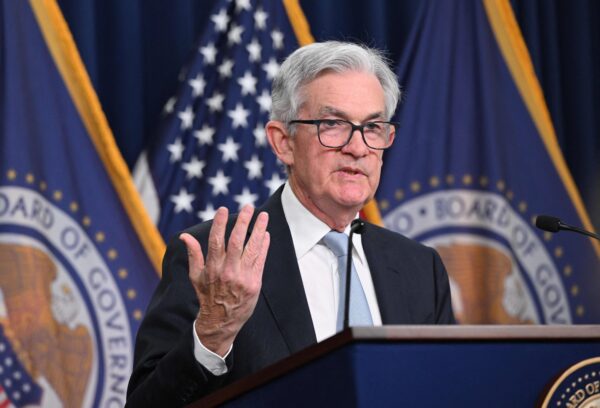US Economic Outlook Darkens as CBO Projects Higher Inflation, Slower Growth
Distressed Patriotic Flag Unisex T-Shirt - Celebrate Comfort and Country $11.29 USD Get it here>>

The Congressional Budget Office (CBO) issued a pessimistic outlook for the economy this week, shortly after the Federal Reserve Chair Jerome Powell suggested that lower interest rate increases are likely on the horizon.
In a Nov. 30 letter responding to questions posed by Sen. Steve Daines (R-Mont.) regarding the CBO’s current view of the economy, the office warned that sustained high interest rates and inflation over the next two years were likely and could lead to slow economic growth and larger budget deficits.
The office also warned that at least one-quarter of negative real GDP growth between now and the end of 2023 is probable, but stopped short of mentioning a possible recession.
“The CBO expects economic growth in 2023 to be slower than it projected most recently, reflecting recent developments (including higher interest rates), and faster in 2024, as the economy recovers,” the CBO wrote. “Higher interest rates, higher inflation, and slower economic growth lead to less purchasing power for households and increased deficits for the federal government.”
The CBO stated that the federal funds rate would likely be greater in 2023 and 2024 than, respectively, the 2.4 percent and 2.6 percent estimated most recently for the fourth quarters of those years.
Federal Deficits to Increase
“The revisions stem mainly from greater increases in 2022 in the federal funds rate set by the Federal Reserve and in inflation than the CBO had projected,” CBO said.
Meanwhile, there is a two-thirds chance that gross domestic product (GDP) adjusted for higher inflation will likely range from -2.0 percent to 1.8 percent from the fourth quarter of 2022 to the fourth quarter of 2023, CBO said.
For 2024, CBO anticipates that real GDP growth will be greater as “the economy recovers from slow growth in 2022 and 2023.”
The office also noted that slower economic growth and higher interest rates would increase federal deficits and debt, with simulations by the CBO, based on 100 simulations of economic conditions over the next two years, indicating that they could run up to $200 billion and $300 billion in 2023 and between $210 billion and $480 billion in 2024.
It also said that purchasing power this year among American households has declined by around $5,500 due to soaring inflation, while households’ market income has risen by just $3,000 on average.
The CBO’s outlook for the economy comes shortly after Powell suggested that the Fed could ease off on its rapid pace of interest rate increases as soon as December.
Powell spoke in prepared remarks at the Brookings Institution, where he noted that the impact of the Fed’s aggressive monetary tightening policy on inflation can take some time to be seen in the economy.

‘Makes Sense to Moderate the Pace of Our Rate Increases’
“Monetary policy affects the economy and inflation with uncertain lags, and the full effects of our rapid tightening so far are yet to be felt,” Powell said. “Thus, it makes sense to moderate the pace of our rate increases as we approach the level of restraint that will be sufficient to bring inflation down. The time for moderating the pace of rate increases may come as soon as the December meeting.”
The Federal Open Market Committee (FOMC) is scheduled to meet for its final meeting of this year on Dec 13–14.
Experts had widely expected policymakers to initiate between a 0.50 or 0.75 percentage-point hike at that meeting, consistent with the pace of 0.75 percent rate hikes that began in June as the central bank attempts to reach its 2 percent target.
At the start of this year, the federal funds rate was only 0.25 percent.
While Powell on Wednesday suggested December may see a lower interest rate hike, the Fed chairman stressed that the central bank will ultimately still need to raise rates to a higher level than it initially planned in order to meet its goal and bring the soaring cost of living under control.
“For starters, we need to raise interest rates to a level that is sufficiently restrictive to return inflation to 2 percent,” Powell said. “There is considerable uncertainty about what rate will be sufficient, although there is no doubt that we have made substantial progress, raising our target range for the federal funds rate by 3.75 percentage points since March.”





